Expanded Meeting of the Government of Tajikistan
Read also
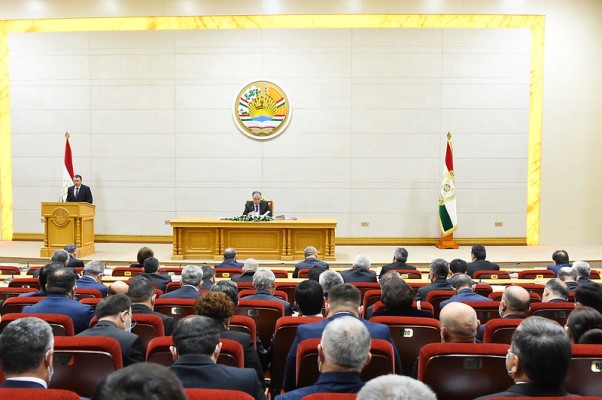
DUSHANBE, 20.01.2022 (NIAT Khovar) – The Founder of Peace and National Unity, Leader of the Nation, President of the Republic of Tajikistan Emomali Rahmon chaired a governmental meeting today.
Taking part in the meeting were the members of the government, chief and senior staff within the Executive Office of the President, heads of agencies, provinces, cities, districts, heads of higher educational institutions, directors of state-owned commercial banks and joint-stock banks, head of mass media, and other officials.
The participants of the extended meeting reviewed economic and social development indicators for 2021 and discussed the main goals for the years ahead.
Prime Minister Kohir Rasulzoda delivered a report on the results of economic and social developments in 2021.
According to Rasulzoda, the gross domestic product (GDP) for the reporting period amounted to 98.9 billion somoni and its growth rate was 9.2%.
In 2021, the total state budget revenues amounted to 29.5 billion somoni, which is 1.3 billion somoni more than planned.
In 2021, 309 new industrial enterprises were put into operation.
Projects worth 16.6 billion somoni are being implemented to ensure the sustainable development of the energy sector and to achieve the set goals.
As a result of the measures taken in the reporting year, the volume of electricity increased by 853 million kW/h or 4.3% compared to 2020.
The total volume of agricultural production amounted to 39.7 billion somoni and its growth in comparison with 2020 reached 106.6%.
In order to support entrepreneurship and improve the investment climate, the government has taken a number of measures to provide tax and customs benefits for the development of domestic production.
In January through September 2021, compared to the same period in 2020, the influx of foreign investment grew 1.6 times.
During the reporting period, the volume of investments in fixed assets amounted to 14.7 billion somoni, which is 23.3% more than in 2020.
The measures made it possible to implement 78 state investment projects totaling 42 billion somoni. Eleven investment projects totaling more than 9.5 billion somoni were implemented in the transportation sector during the reporting period, out of which 4.8 billion somoni has already been disbursed since the start of these projects.
In 2021, the total trade turnover amounted to 40 billion somoni, which is 13% more than compared to 2020.
The volume of paid services in all service areas in 2021 reached 15 billion somoni, which is 7.9% more than in 2020.
Despite the difficult situation due to the spread of COVID-19, which limited the financial situation of trading partners and the import of goods, in 2021 the trend of growth of foreign trade was ensured.
Foreign trade turnover in the reporting period likewise increased by 39.5% compared to 2020.
Rasulzoda noted that during the reporting period, more than 5.6 billion somoni was allocated from the state budget toward education, which is 592 million somoni or 12% more than in 2020.
During the same period, in order to develop the infrastructure, more than 238 educational and preschool institutions were built and put into operation.
In order to develop the healthcare sector, 2.3 billion somoni was allocated from the state budget for the development of the sphere in 2021, which is 27.6% more than in 2020.
Budget financing in the field of social protection of the population also increased, with 172 million somoni channeled in this direction in 2021, which is 23.4% more than in 2020.
Along with this, through the implementation of a pilot mechanism for the provision of targeted social assistance, more than 238,000 citizens and low-income families received benefits in the amount of more than 110 million somoni.
Minister of Finance Fayziddin Kakhhorzoda, Chairman of the Tax Committee Nusratullo Davlatzoda, head of the Customs Service Khurshed Karimzoda, and Director of the Social Insurance and Pensions Agency Dilmurod Davlatzoda also reported on the accomplishments of the past year.
In 2021, 13.7 billion somoni was been transferred to the state budget from taxes and internal payments, which exceeds the forecasted indicators by 101.0 million.
The execution of plans for taxes and payments in all regions of the republic, including in the Gorno-Badakhshan Autonomous Region, was completed by 114%, in the Khatlon region — 106.3%, in the Sughd region — 106.0%, in Dushanbe — 103, 0%, and in cities and districts of republican subordination as a whole by over 100%.
Prosecutor General Yusuf Rahmon, Director of the Agency for State Financial Control and Fight against Corruption Sulaimon Sultonzoda, and Chairman of the Accounts Chamber Karakhon Chilazoda reported on the activities of control and audit bodies in preventing crime, eliminating violations of law in all socio-economic spheres, and obligatory observance of current laws.
In his report the Chairman of the State Committee for Investments and State-owned Property Management Sadi Kodirzoda noted that 25 business and investment forums were organized in Dushanbe, Sughd, Khatlon, Rasht, and Kulob with the participation of domestic and foreign investors, within which 50 new documents and agreements were signed on cooperation totaling 7.2 billion somoni, including one for the construction of new industrial enterprises.
The Chairman of the National Bank of Tajikistan Kholikzoda Hokim and Chairman of the State Savings Bank of Tajikistan Amonatbank Ikromi Sirojiddin also reported on banking and effective monetary policy.
Minister of Industry and New Technologies Sherali Kabir also spoke during the meeting.
The declaration of 2022 — 2026 as the Period of Industrial Development will lay a solid foundation for the implementation of the process of rapid industrialization of the country.
In 2021, the new industrial enterprises that have been put into operation created more than 5,000 new jobs, and the growth of industrial production increased by 22%.
President Emomali Rahmon ordered the leadership of the Ministry of Industry and New Technologies to implement one of the strategic goals, namely the acceleration of industrialization, expanding production capacities, increasing competitiveness, increasing import-substituting products and export-oriented products, and processing of raw materials within the country and to develop textile and clothing industry in Tajikistan.
Minister of Energy and Water Resources Daler Juma, General Director of Rogun HPP Khairullo Safarzoda, and Golib Ubaidullozoda, head of the State Energy Supervision Service, were instructed to expand work on the construction and renovation of energy facilities, prevent technical and commercial losses of electricity, eliminate debts for providing electricity to organizations and departments, and accelerate the construction work at the Rogun hydroelectric power plant.
Minister of Agriculture Sulaimon Ziyozoda and Chairman of the State Committee for Land Management and Geodesy Orif Khojazoda reported on the targeted use of land, introduction of new lands into agricultural circulation, increase in agricultural production and its export outside the country, development of poultry farming, livestock breeding, fish farming, vegetable growig, crop production, use of high-quality seeds, mineral fertilizers, elimination of shortcomings, and violations of the law in the distribution of land, as well as other issues related to the field.
Minister of Education and Science Muhammadyusuf Imomzoda, Minister of Health and Social Protection of the Population Jamoliddin Abdullozoda, and Minister of Labor, Migration and Employment Shirin Amonzoda were instructed to take measures to improve the situation in the field of education, ensure the sustainable development of the education sector, build and reconstruct new modern schools, medical posts and health centers, and solve the issues related to the employment of the population.
Head of the Communications Service Beg Sabur, Chairman of the Committee for Architecture and Construction Mahmadsaid Zuvaydzoda, General Director of Housing and Utilities Jamshed Tabarzoda, Chairman of the Local Development Committee Kosim Rohbar, Chairman of the Committee for Youth and Sports Abdullo Rahmonzoda, and Chairman of the Committee for Emergency Situations and Civil Defense Rustam Nazarzoda reported on the results of 2021 and tasks for 2022.
Chairman of Dushanbe Rustam Emomali stated that within the framework of the action plan for the celebration of the 30th anniversary of state independence, 4,371 creative undertakings were carried out in the capital, the implementation of the plan was 104% ensured, 16 general education and preschool institutions, as well as eight healthcare institutions were built in the city. Fifty industrial enterprises and workshops, 162 km of roads, 19 administrative buildings, 225 high-rise buildings with 161 service centers, 62 sports grounds, nine squares, 2,321 residential and administrative buildings, and 116 dormitories were repaired.
According to Rustam Emomali, in 2021 the volume of industrial production amounted to 114%, investments in fixed assets increased 1.5 times, volume of trade amounted to 115%, paid services to 123% and cargo transportation to 104%.
The results of the socio-economic development of cities and regions for 2021 were reported by the Chairman of Khatlon region Kurbon Hakimzoda, Chairman of Sughd region Rajabboy Ahmadzoda, and the Chairman of the Gorno-Badakhshan Autonomous Region Alisher Mirzonabot.
President Emomali Rahmon gave specific instructions to the chairmen to strengthen the process of preparing for the 35th anniversary of independence, facilitate in the implementation of the previously set goals, and in the development and implementation of an action plan for the implementation of the Years of Industrial Development 2022-2026. He also noted the importance of settlement of public appeals, support for domestic entrepreneurship, strengthening cooperation with the private sector, ensuring sustainable socio-economic development, increasing industrial and agricultural production, increasing their exports, as well as improving the activities of educational, healthcare and cultural institutions.











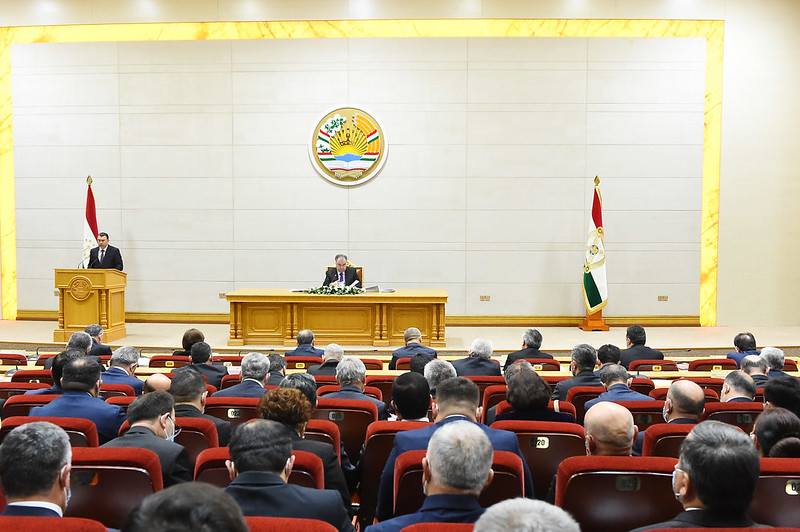
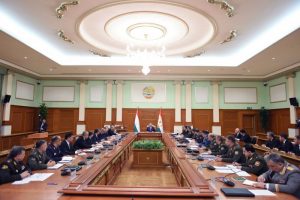 President Emomali Rahmon Holds Security Council meeting
President Emomali Rahmon Holds Security Council meeting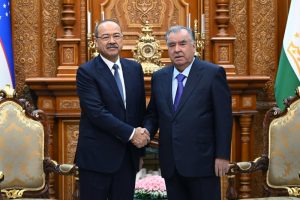 President Emomali Rahmon Receives the Prime Minister of the Republic of Uzbekistan Abdulla Aripov
President Emomali Rahmon Receives the Prime Minister of the Republic of Uzbekistan Abdulla Aripov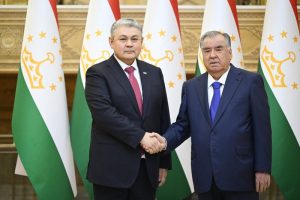 President Emomali Rahmon, Received the Minister of Foreign Affairs of the Republic of Kazakhstan
President Emomali Rahmon, Received the Minister of Foreign Affairs of the Republic of Kazakhstan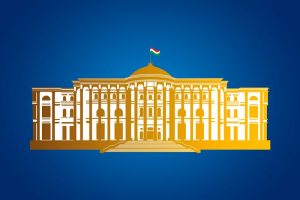 President Emomali Rahmon Enacts New Laws
President Emomali Rahmon Enacts New Laws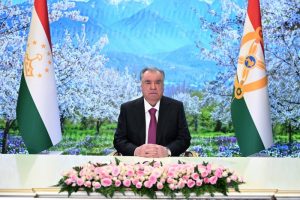 President Emomali Rahmon Sends Festive Greetings to President Xi for Chinese New Year
President Emomali Rahmon Sends Festive Greetings to President Xi for Chinese New Year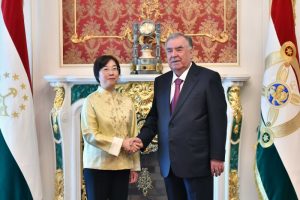 President Emomali Rahmon Receives AIIB President Zou Jiayi in Dushanbe
President Emomali Rahmon Receives AIIB President Zou Jiayi in Dushanbe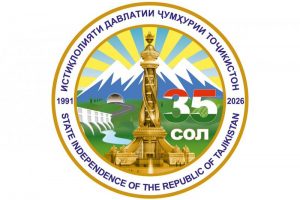 President Emomali Rahmon Approves Emblem for the 35th Anniversary of Tajikistan’s State Independence
President Emomali Rahmon Approves Emblem for the 35th Anniversary of Tajikistan’s State Independence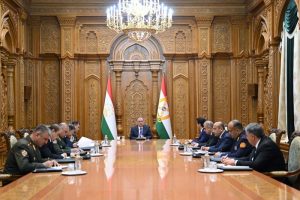 President Emomali Rahmon Holds Working Meeting with Heads of Security and Law Enforcement Agencies
President Emomali Rahmon Holds Working Meeting with Heads of Security and Law Enforcement Agencies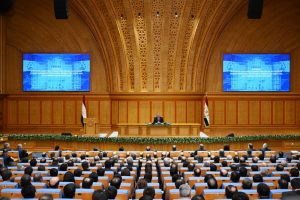 Expanded meeting of the Government of the Republic of Tajikistan
Expanded meeting of the Government of the Republic of Tajikistan














